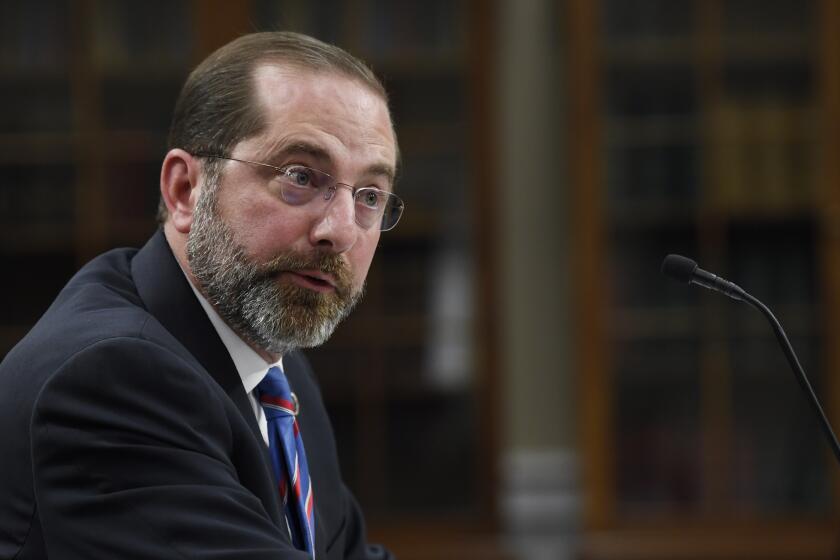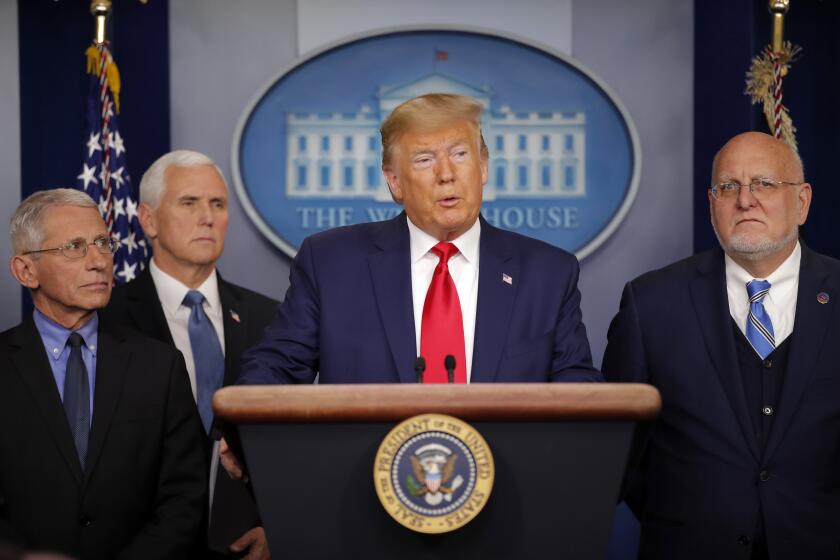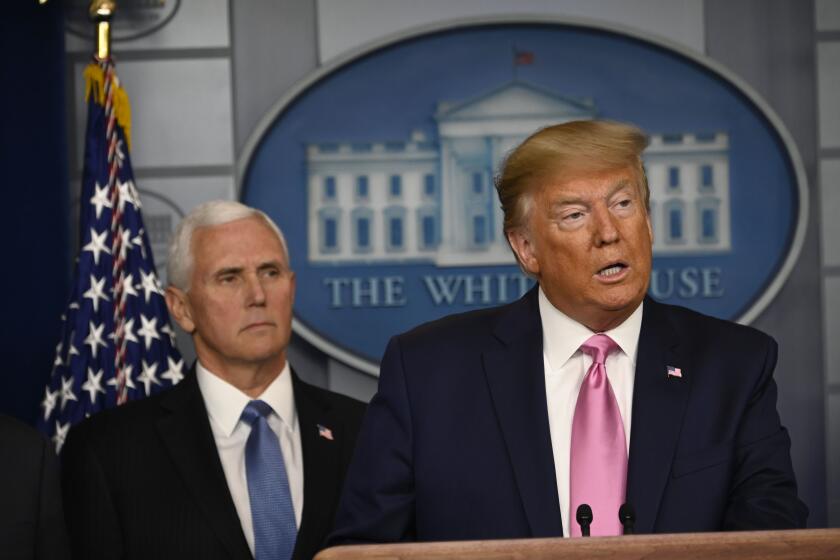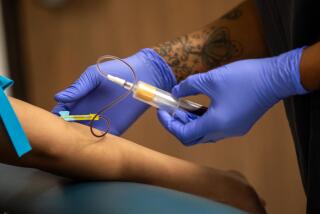Government can’t order insurers to cover the coronavirus for free. Here’s why
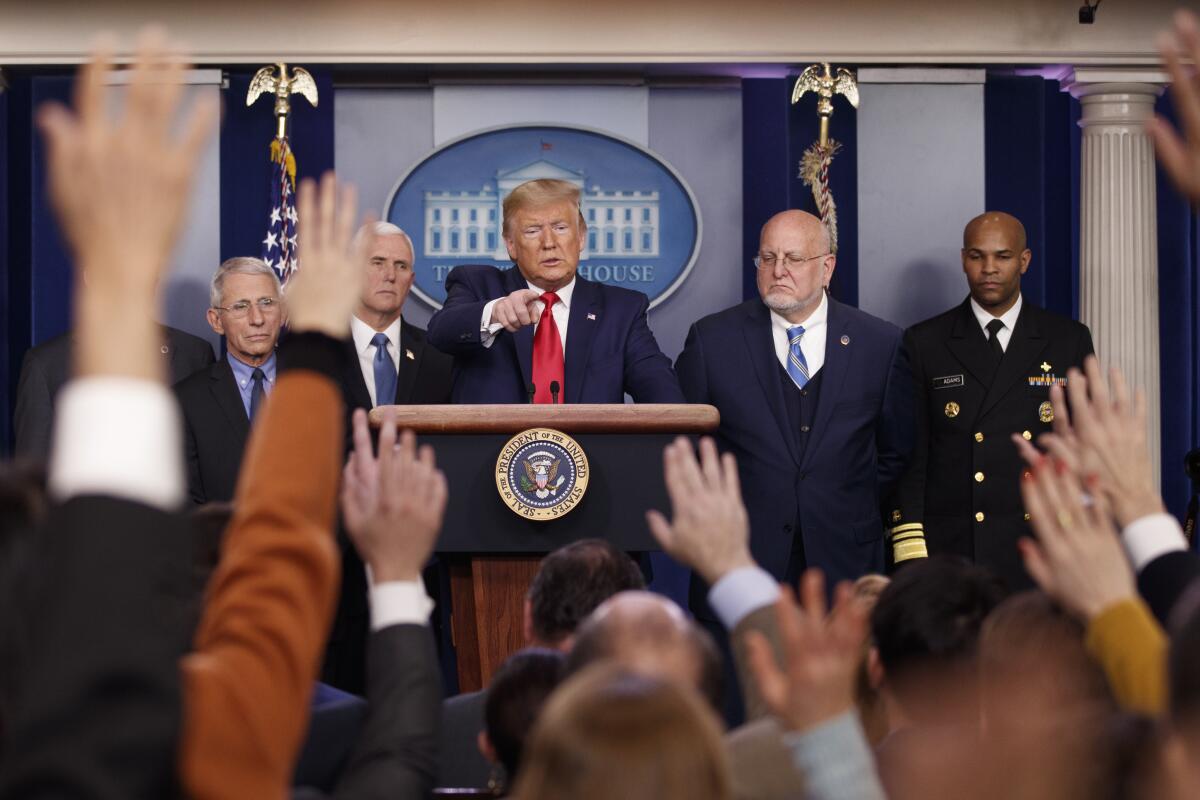
- Share via
The health insurance industry, several states and the federal government have been falling over themselves to assure Americans that they should have no fear about getting tested for the novel coronavirus — tests will be administered for free, they say, without deductibles or co-pays.
Problem solved, right?
Well, not really.
The federal government simply does not have the legal power to require employers to cover coronavirus testing without cost-sharing.
— Nicholas Bagley, University of Michigan
The assurances made by insurers such as Cigna and Aetna, states including Washington, New York and California, and the Trump administration’s coronavirus task force are “more limited in scope than they appear,” observes Nicholas Bagley, a health law expert at the University of Michigan. They offer no guarantees at all to the estimated 100 million Americans who receive their coverage through self-insured employers — more than 60% of all those covered by employer plans.
The reason is that states are preempted from regulating self-insured employer plans. That’s an artifact of ERISA, the Employee Retirement Income Security Act of 1974. ERISA preempts state regulation of employee benefit plans.
The law left regulation of health insurance to the states, but self-insured employers aren’t considered insurers under the law, so they’re exempt from state oversight. Issuing orders to self-insured employers about COVID-19 would require an act of Congress.
Typically, self-insured employers hire name insurance companies to administer their plans, but they pay the costs themselves and have the right to set benefit and cost-sharing terms as they wish. Big employers generally are required by the Affordable Care Act to offer insurance to their employees, but the act gives them considerable latitude to design their plans.
By limiting sick leave and free healthcare, the U.S. system will promote the spread of coronavirus.
As of now, Bagley writes, “the federal government simply does not have the legal power to require employers to cover coronavirus testing without cost-sharing.”
If you needed one more data point about the drawbacks of America’s fragmented and dysfunctional healthcare delivery structure, here it is.
That’s not all. The commitments made by the states, the federal government and insurers have been carefully worded to apply only to coronavirus testing. For the most part, they’re silent on what happens to a patient if a test comes up positive. None has made a commitment to cover treatment without cost-sharing.
That could discourage people from even asking for a test — individuals whose tests reveal an infection might realize that they’re facing a potentially costly stay in a hospital and might choose not to know.
Let’s take a look at what’s been promised and where it falls short.
To begin with, the federal task force headed by Vice President Mike Pence announced Wednesday that the test was deemed an “essential health benefit.” That’s a category created by the Affordable Care Act, designating services that must be offered by insurance plans. The 10 EHB categories include hospitalization, mental health care, prescriptions and certain preventive procedures.
Placing coronavirus tests on the list means that their costs will be covered for Medicaid patients. But it doesn’t mandate a waiver of cost-sharing for Medicare, private or ACA plans. “Insurers can (and do!) impose cost-sharing for EHBs, and could do so for a COVID-19 test,” Bagley observed, calling Pence’s designation of the test as an EHB “a completely meaningless statement.”
The coronavirus shows why Trump’s healthcare policies are dangerous for all
As David Anderson, the health insurance expert at Duke University, puts it: “The question is not if a COVID-19 screen is a covered benefit under current EHB regulation. The question is who pays and if there are barriers to access and care.”
The federal government could require a waiver of cost-sharing for the tests, under a provision of the ACA applying to preventive procedures certified by the U.S. Preventive Services Task Force. But the task force doesn’t customarily issue emergency recommendations, and under the ACA whatever recommendations it does issue can’t take effect in less than one year. So there’s no joy coming from that quarter. Congress could legislate a change and Trump could sign it, but that hasn’t happened yet.
The states of Washington, New York and California all have issued directives that insurers subject to their regulations waive cost-sharing for tests. Washington, which has become a hot spot for COVID-19 infection, also has ordered that insurers waive prior authorization procedures for tests and treatment, though it doesn’t guarantee a waiver of cost-sharing for the latter.
Washington also has ordered insurers to allow patients to obtain one-time refills of covered prescriptions sooner than the customary refill waiting periods so that patients can keep a backup supply on hand.
In California, Gov. Gavin Newsom and state Insurance Commissioner Ricardo Lara said Thursday that they were ordering all public and commercial insurance plans to cover the entire cost of testing for the coronavirus and medically necessary screening.
The coronavirus crisis shows how the free sharing of data is crucial in science.
As my colleagues Phil Willon and Noam Levey reported, the orders mean that Californians will not have any out-of-pocket expenses for the tests, even if they’re screened at hospital emergency rooms and urgent care clinics. State officials say the orders would cover some 22 million Californians — but that leaves more than 17 million outside their reach, whether because they’re covered by federal programs or self-insured employers or they simply don’t have health coverage.
Plans sold through Covered California, the state’s exchange for individual ACA plans, are subject to the directive, state officials say. Like New York’s ACA exchange, Covered California is actively managed, meaning it has the authority to set benefit terms for its plans.
As for the commercial insurance industry, its principal trade group, America’s Health Insurance Plans, was rather vague about what its member carriers would guarantee. “We will cover needed diagnostic testing when ordered by a physician,” AHIP said in a statement attributed to its board of governors. “We will take action to ease network, referral, and prior authorization requirements and/or waive patient cost sharing.” That sounds aspirational, not concrete.
Cigna and Aetna (through its parent CVS Health) both issued statements assuring their enrollees that they would be able to receive COVID-19 testing without cost-sharing. One can expect other major insurers to follow suit.
ERISA’s preemption of state regulation of employer plans may be the biggest gap in requiring coverage of testing without cost-sharing.
“Self-insured plans don’t have to listen to state regulators,” Duke’s Anderson notes. Whatever they’ve promised the public, he adds, the insurers “can’t make employers that actually pay the claims do anything that the employers don’t want to do.”
Anderson says it’s a good bet that employers with self-funded plans will go along with their insurance firms’ policies as a matter of “good corporate citizenship or fear of negative PR.”
But that’s a thin reed for the healthcare system of the entire nation to rely on. At this moment, the coronavirus battle in the U.S. is relying on hope and unenforceable promises to battle a burgeoning enemy.
More to Read
Inside the business of entertainment
The Wide Shot brings you news, analysis and insights on everything from streaming wars to production — and what it all means for the future.
You may occasionally receive promotional content from the Los Angeles Times.

